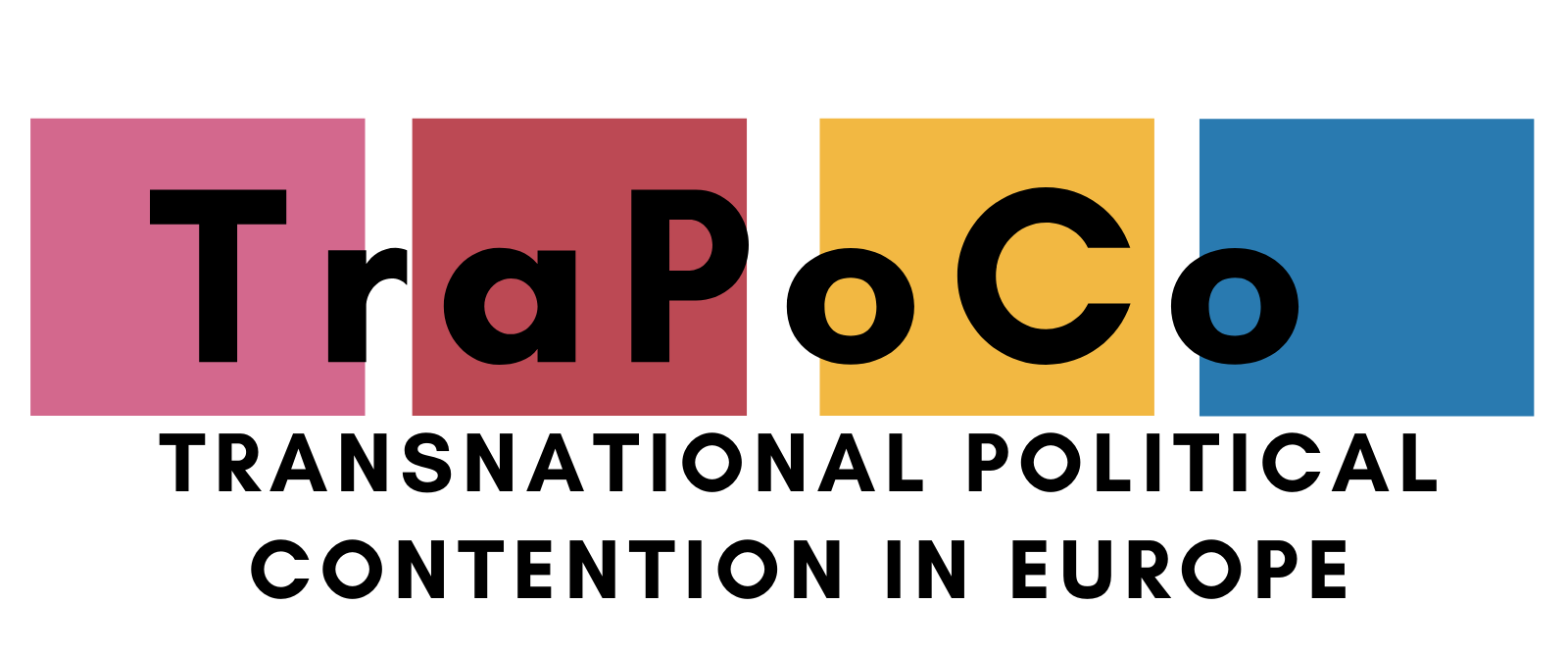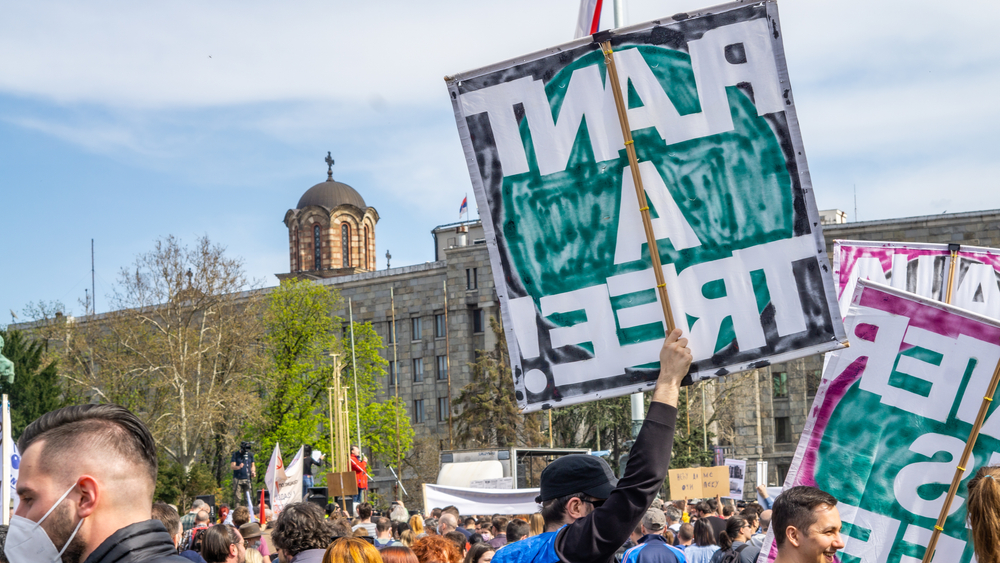
© chayanuphol/Shutterstock
Through transnational political activism, social actors contribute to deepening democratic processes on a European level, also in the environmental sector. An interview with Aron Buzogány, professor for political science at the University of Natural Resources and Life Sciences in Vienna
Can you briefly introduce your research field?
My research work focuses on civil society organizations (CSOs) and social movements working on environmental protection and climate movements mostly in Eastern European countries, including EU member states - like Hungary, Romania and Poland - but also neighboring countries beyond EU borders.
More specifically, I am interested in how these CSOs work, what kind of strategies they use, and also how they relate to the European Union (EU). In many cases the EU is indeed a very important factor for these groups, because it provides political opportunities to mobilize, and helps them to reach their political goals by putting pressure on their governments.
This happened mostly during the EU accession process and its immediate aftermath. In more recent year, conditions have changed and civil society is now having a more and more difficult time in the region.
You said that the European Union provides opportunities for CSOs. Is the EU still an ally of local CSOs in their political struggles?
What we found in our research in the last 2 or 3 years is that after the Eastern enlargement the leverage of NGOs from the new member states - which used to be supported from the outside - declined; this is what happened in Hungary and Poland, for example.
This also has to do with the change in their governments and their positions towards the EU. In countries like Hungary and Poland, for example, eurosceptic governments have adopted a more hostile position towards civil society, and this is not only about environmental groups, but civil society in general. Similar trends could be witnessed also in the EU’s neighbourhood or the Western Balkans.
In addition, after the EU accession, CSOs from Central and Eastern Europe started to get less money than they used to, so they had to find different and alternative financial sources.
What we find in our research work is that, because of the lack of funds, many CSOs tend to work more on the grassroots level, losing the opportunity to be influential and play a role in larger policymaking debates.
Was there some sort of cooperation between government and civil society in countries such as Hungary, Poland or Romania before EU accession?
Not so much in Romania, but in Hungary and in Poland, yes, of course. Here in the late nineties and early 2000 there was an established collaboration between the two sides. It was not necessarily friendly - nobody expected that - but they established some kind of collaboration which was mutual and at some point also quite mature and well functioning.
Today civil society could rely more on European Union mechanisms, including infringement procedures in the environmental field, something that they could not do in the past...
The paradox is that now CSOs can denouce their governments and use all these opportunities, but it seems that they are not really able or willing to do so. In Poland there have been cases of civil society groups that together with other international CSOs were in the position to submit complaints to the EU. However, this is not easy and it requires a lot of resources. During the accession period governments were very eager and interested in involving all kinds of actors into the process; that was the period when civil society groups could really mobilize. When the process endend, the conditions changed. There were many reasons for this change, it was not only about Eurosceptic governments, but also because the external funding started to diminish and the momentum changed.
Do civil society groups still see the European Union as a political horizon for their actions or for their contention?
My impression is that from the side of civil society there is more realism - but also more skepticism -, which in some cases was not absent even before. The EU has always represented an opportunity for CSOs, mostly for the funding. But that didn't mean that there was full support for EU policies, especially because EU policies are often very controversial.
Take for example environmental policy and transport policy or industrial policy and think about a project to build a highway that goes through natural protected areas: EU policies clash and cause conflicts at the local level, and environmental NGOs find themselves in the middle of this conflict. We had some very prominent cases like this in Poland, Bulgaria or Hungary in the last ten years, mostly about cutting of forests or the implementation of industrial projects in some natural protected areas.
What about the transnational dimension in terms of regional or cross-border cooperation? Is there some sort of alliance at the European level?
Yes, of course. There is EU- related collaboration, however many of the networks do not focus only on EU issues, but also on practical cooperation in specialized fields.
For example, groups focusing on protected areas or animal protection have been collaborating for many years, even during the Cold War. These groups were built on epistemic communities which were working together based on some functional problems or on some UN projects. There were cases of regional cooperation on cross-border projects as well.
If you look at former-Yugoslavia, there was some sort of collaboration between different green groups, which was not really related to the EU. The collaboration between networks working on water quality or river basins, air pollution - which do not know physical borders - was very important in bringing together people across countries.
These epistemic communities are also communities of practice, because in the end it is not only about academics, but also and above all about practitioners...
Many of these organisations have a hybrid nature, some stem from epistemic communities, but then they transform into CSOs. These organizations have become quite complex, because to survive economically they started to work in different fields. Some were very successful with this diversification and learned to diversify not only what they do, but the funding that they receive. In Central and East European countries, it was very important to have domestic and local funding or to work with schools or academic organizations.
Of course, from the outside this gives the impression that civil society work is not very coherent, but the fact is that they were forced to be so incoherent. And I would say they were rather inventive.
On the other hand this diversification is also a good thing for the transnational dimension: CSOs realized that in many cases they had to cooperate at this level to apply for funds. If you think about the Caucasus, and probably also the Balkans, this bottom-up collaboration helped to strengthen cooperation between countries which otherwise did not really cooperate, or to re-establish networks which were existing in the Soviet Union or Yugoslavia.
For example Armenian and Azerbaijani NGOs were not able to cooperate, they had to do that together with Georgian NGOs or on Georgian territory, because they couldn't really travel across their borders. It was all very complicated, and working on the same projects was basically the only connection they had. So, even though they could not visit each other in their countries, they still had this kind of connection. This didn't help a lot at the level of high politics, but at least there was some grassroots cooperation. Now with the renewed conflict in Karabakh the danger is that these ties will be cut.
Now with the war in Ukraine civil society networks will be very important in the post-war recovery. There are already manifold networks which Ukrainian or Moldovan NGOs can build. And this, I think, is very important. I'm not talking only about environmental policy, because there are more urgent issues, such as humanitarian aid in areas that were completely destroyed. But there are also important discussions taking place in transnational networks, like the Ecodozor network documenting ecocide – the environmental casualties of the war.
What strategies does civil society use?
It depends on case to case. Before EU accession there was some kind of cooperation in terms of policy cooperation and exchange of expertise between authorities and CSOs. This has changed after accession: on the one hand there was more confrontation, protests, and also cases of litigations. However, to go to court you need a reliable legal system, but as our research with Szabina Kerenyi and Gergely Olt shows, in illiberal regimes such as Hungary there has become increasingly difficult for NGOs. In other countries such as Romania and Bulgaria, the system was never transparent and reliable enough for CSOs to be successful before the court. It was extremely difficult to get through the corrupt system and it required a lot of resources from NGOs, so it just didn't make sense to fight that war.
There are many other ways, more informal and probably much more successful ones in the end. In the case of Romania and Bulgaria and more recently also of some of the Western Balkan countries, like Serbia, large scale protests were very important. In the case of the environment, these issues were basically advanced by the young generations going to the streets. Our work with Antoaneta Dimitrova from the University of Leiden on Romania and Bulgaria shows that environmental movements also often overlapped with anti-corruption movements, because the two issues are often correlated. The rule of law is very closely related to environmental policy and the use of natural resources. This is why it became such an important field of mobilization: it is an umbrella many can identify with.
What is interesting is that environmental protests are in a way a revival of the protests of the Eighties. In Bulgaria, Hungary and the Czech Republic we had quite important environmental protests in the 1980s because the socialist regimes were heavily industrializing and this heavy industrialization was damaging for nature. The interesting thing is that the socialist governments could not really stop them, because even those authoritarian governments could not argue that they were against nature.
Now we have other movements with a different generation and also with a much more transnational embedding, although scholars and researchers argue that there were many transnational networks already back then: Austrians NGOs or groups were present in Hungary and also in the Balkans; there was also an East-East cooperation between East Germany, Poland and the Czech Republic, and even Soviet groups were quite well connected. So environmental groups were present also in socialist regimes, the situation was more complex, but they were present. But this is already something for historians.
It seems that there is still a difference between Western and Estern Europe. To what extent are CSOs organizations from Eastern Europe already part of larger movements? Like Fridays for Future or Extinction Rebellion...
I find that the new climate movement is not that present in Central and Eastern Europe and it also has a different profile. We are analyzing profiles of Fridays for Future protestors with my colleagues Dániel Mikecz and Piotr Kocyba and find some important East – West differences. Climate activism is less of a left-wing issue in the East, for example, which also applies to environmentalism. Czech Republic is perhaps an exception, mostly because there is a long tradition of climate movement and there are many protests against coal mining, so the Czech movement seems to be much more connected to the Western European ones.
Much of the discourse in these countries is about industrialization and the Western European development model; reaching Western European standards of development is still a dream for large parts of the society, so environmental movements that criticize such growth models do not receive much support and are ridiculed.
The development of these countries in the last 30 years is highly problematic and the transition from communism to consumerism was the biggest problem in environmental terms. Many of these countries became sort of pollution havens where different industries from Western Europe went because it was much easier to pollute there than at home, much cheaper… unfortunately, in those countries which are not part of the European Union this is still happening. In a sense, polluting industries were exported, and resources like timber for example, were overused – also because Western markets were hungry for these.
In addition, most of the Eastern European countries still have a very problematic legal system; the level of corruption in fields like forestry is high in countries like Romania or Ukraine. Large parts of the Carpathians are already exploited and (mostly) Western logging companies are moving or have started moving in the last five, six years to other countries like Ukraine. Our research with Simona Davidescu shows how civil society networks in this field became active by using both local and international ties.
Eastern European civil society has also lost its central role because EU-related issues have lost their centrality. Before accession this was the focus that replaced everything, while afterwards there was a kind of awakening, a frustration with Western influence and a desire to find one's own way.
Is there a sovereinist turn also for civil society?
There are different trends at the same time. Some organisations look more inward in their own countries and work mainly at the local level because they cannot reach the national one. In countries like Hungary and Poland, CSOsare attacked quite explicitly, so many have started to focus on non-political issues.
There are other organisations that are much more active and critical and try to use transnational networks; they represent the internationalised civil society, so to say.
Lastly, another numerically important part of civil society is that formed by or linked to illiberal parties. Some of these groups only deal with local politics, so in a way they are not problematic, although they naturally have a friendly attitude towards these regimes or at least do not criticise them. This is the response to the elitism of the civil society sector, which was nurtured partly from abroad and became very outspoken in everything, sometimes at the price of forgetting about the grassroots.
Overtime CSOs have become more professionalized...
Exactly. Since the 1990s and the early 2000s, the sector has become more professional and this development was clearly linked to external funding. During the nineties and the accession period there was a euphoria for civil society. While some groups were excluded from this development, others became more international and transnational. Today, some of these have become highly professionalised and also very influential. The organisations dealing with illegal logging in Ukraine, for example, have influence on the government. They are also an important resource for the EU, which uses civil society studies on corruption in the forestry sector, etc.
However, the role of the EU is also controversial. There are various types of civil society, some are very professionalised, others work more locally, but we cannot say that one is only good and the other is bad. I think this is what we have learnt after many years of research, that we should avoid these very naive and optimistic views and try to look more at the work of civil society in practice.
factbox-onlysmall
This interview was conducted for our TraPoCo project dedicated to the study of transnational political dynamics in Europe and the role of social actors such as movements, civil society organisations, activists and trade unions
The European Commission's support for the production of this publication does not constitute an endorsement of the contents, which reflect the views only of the authors, and the Commission cannot be held responsible for any use which may be made of the information contained therein. The project's page Trapoco
blog comments powered by











